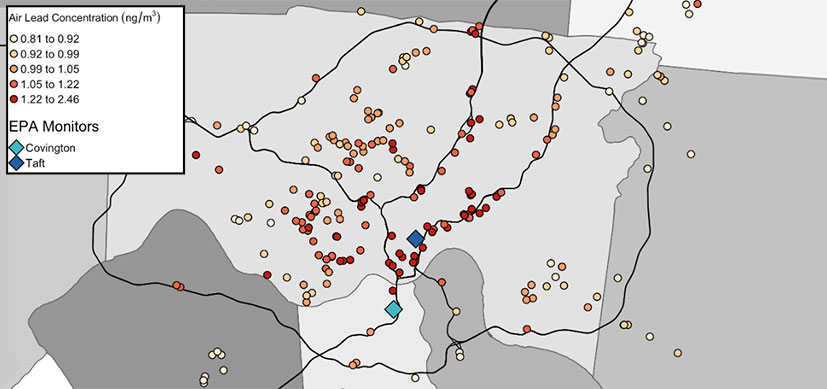
Nicholas Newman, DO, MS, FAAP
- Attending Physician, Division of General and Community Pediatrics
- Medical Director, Pediatric Environmental Health and Lead Clinic
- Associate Professor, UC Department of Pediatrics
- environmentalhealth@cchmc.org
- Board Certified
About
Biography
When I was a child, I missed a lot of school and activities because of my allergies and asthma. It wasn’t until I got older that I realized environmental exposures were the root cause of my condition.
As a pediatric environmental health doctor, I help families identify and reduce triggers and allergens that affect their child's health.
I strive to be as empathetic as possible. Families and kids need to know that someone really cares about them and will help them address their health concerns. There are so many behind-the-scenes details to consider when caring for sick children. I work hard to stay up to date on the latest medical advances and use evidence-based practices.
My training in pediatrics and occupational and environmental medicine lets me educate families about environmental triggers related to their child’s condition. I partner with families to help them remove or reduce the impact of these triggers.
My research focus is two-fold:
- I want to better understand how common environmental exposures, like air pollution and lead exposure, influence neurodevelopment and behavior in children.
- I work to improve asthma treatment by understanding environmental triggers and by developing interventions to reduce them.
My recent research received the Michael Shannon Award for Pediatric Environmental Health Research from the American Pediatric Association. This project examines the influence of housing age and socioeconomic status on childhood lead levels.
I also serve as co-director of the Community Engagement Core through the University of Cincinnati Center for Environmental Genetics. This is a National Institutes of Health (NIH)-funded research center. I actively work with communities to help them identify and advocate for improving air pollution and lead dust in neighborhoods.
When I’m not at work, I love competing in triathlons, cooking and reading philosophy or history. I also enjoy spending time with my wife and adult children.
BS: Massachusetts Institute of Technology, Cambridge, MA, 1990.
DO: Kirksville College of Osteopathic Medicine, Kirksville, MO, 1997.
Rotating Internship: Horizon Health System/Henry Ford Health System, Michigan State University, Detroit, MI, 1998.
Residency: Pediatrics, Children's Hospital of Michigan, Wayne State University, Detroit, MI, 2001.
Fellowship: Occupational and Environmental Medicine, University of Cincinnati, Cincinnati, OH, 2011.
MS: University of Cincinnati, Department of Environmental Health, Cincinnati, OH, 2011.
Certification: American Board of Pediatrics, 2001 (renewed 2008); American Board of Preventive Medicine, 2013
Services and Specialties
General and Community Pediatrics, Environmental Health, Attention Deficit Hyperactivity Disorder ADHD
Interests
Environmental health; asthma; ADHD; environmental justice; community engagement
Research Areas
Attention Deficit Hyperactivity Disorder ADHD, Global Health, General and Community Pediatrics
Additional Languages
FrenchLocation
Insurance Information
Cincinnati Children's strives to accept a wide variety of health plans. Please contact your health insurance carrier to verify coverage for your specific benefit plan.
Publications
Standardizing Clinical Response to Results of Lead Screening: A Quality Improvement Study. Pediatrics. 2019; 143:e20183085.
A Community-Academic Partnership to Reduce Lead Exposure From an Elevated Roadway Demolition, Cincinnati, Ohio, 2012. Public health reports (Washington, D.C. : 1974). 2017; 132:622-626.
Integrating Environmental Management of Asthma into Pediatric Health Care: What Worked and What Still Needs Improvement?. Clinical Pediatrics. 2016; 55:1271-1278.
Investigation of Childhood Lead Poisoning from Parental Take-Home Exposure from an Electronic Scrap Recycling Facility — Ohio, 2012. Morbidity and Mortality Weekly Report. 2015; 64:743-745.
Traffic-related air pollution and asthma hospital readmission in children: a longitudinal cohort study. The Journal of Pediatrics. 2014; 164:1396-1402.e1.
Traffic-related air pollution exposure in the first year of life and behavioral scores at 7 years of age. Environmental Health Perspectives. 2013; 121:731-736.
Translating knowledge about environmental health to practitioners: are we doing enough?. Mount Sinai Journal of Medicine: A Journal of Personalized and Translational Medicine. 2010; 77:114-123.
Prescriptions (Rx) for Prevention: Clinical Tools for Integrating Environmental Health into Pediatric Clinical Care. Journal of public health management and practice : JPHMP. 2025; 31:244-251.
A call for solutions-oriented research and policy to protect children from the effects of climate change. Pediatric Research. 2024; 96:1532-1534.
Use of Antibiotics in Animal Agriculture: Implications for Pediatrics: Technical Report. Pediatrics. 2024; 154:e2024068467.
From the Blog
Workshop Report Published on Ohio Train Derailment
Nicholas Newman, DO, MS, FAAP2/15/2024
Airborne Lead Exposure in Childhood Linked to Behavioral Problems in Adolescence
Nicholas Newman, DO, MS, FAAP, Cole Brokamp, PhD ...3/24/2021









Patient Ratings and Comments
All patient satisfaction ratings and comments are submitted by actual patients and verified by a leading independent patient satisfaction company, NRC Health. Patient identities are withheld to ensure confidentiality and privacy. Only those providers whose satisfaction surveys are administered through Cincinnati Children’s Hospital Medical Center are displayed. Click here to learn more about our survey